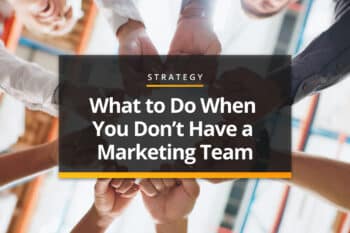What? Do you want accountability? Do you have an expectation for return on investment for a marketing effort? Do you actually expect someone to give you a definitive answer so you can hold me (or someone) accountable for the considerable time, resources and financial investment that is content marketing?
But, this is the new age of social marketing. We don’t measure results in dollars and cents (sense?). We measure followers. We measure likes. We measure page rank and backlinks and unique site visitors.
Rather than give you a bunch of CYA disclaimers, here’s my ‘no B/S’ answer on how long it takes for a content marketing strategy to work: 12 months.
Could you see positive results before then? Sure. In fact, you probably will see benefits and improvements across many of the engagement metrics mentioned above within a few months of launching a serious effort to create great content.
BUT, if your content marketing strategy has not yielded enough profitable revenue to pay for itself (and then some) within the first 12 months, something’s wrong.
Now the Rest of The Story
Note: in the above declaration I did NOT say stop your content marketing campaign if you aren’t seeing results at the 12-month mark. I am saying, something’s wrong and that adjustments and corrections to the strategy need to be made. This may include discontinuing your efforts. But that isn’t very likely.
Your inbound marketing campaign is one of the most important aspects of making your business a success. But these things do take time. While I expect, as a service provider, to be held accountable for results after a 12-month investment by the client. That expectation comes with certain caveats.
The first is that you…now, hold onto your hats…stick with it for 12 months. This is NOT the same media channel as a direct marketing effort of say 1985, where you drop a mailer, get a 2% response and know if it worked within the first 6 weeks of the mailing. Nor is it a broadcast email program of 1995 where you blast out to 100,000 of your closest friends and know if the campaign worked within a matter of hours.
This is inbound marketing and that means creating a trail of great content over the course of many months in order to build credibility, establish trust, and bring qualified business leads to you. The difference is traditional marketing efforts spend a lot of time, a lot of effort and a lot of money on something that, if you’re lucky, results in a 2% response and is over the moment your top spending money. And that 2%? That was over 20 years ago before those rates were standard.
Most people in the direct marketing arena will attest that they’re lucky to see .5% (one-half of one percent). And that means 99.5% of your activity in that channel was wasted.
Here’s the thing. Every marketing channel has its pros and cons. With inbound marketing the pros are:
- less wasted effort
- a longer ‘tail’ – meaning the shelf life for great content is YEARS (not hours).
- the leads you bring in are informed, qualified buyers
- the leads have chosen the contact forum and channel so they feel in control and aren’t as defensive as they might be with someone making a ‘cold call’
- you are positioned as an expert — which makes the lead conversion that much easier
What can I expect WITHIN those first few months?
While it may be difficult to measure success in dollars within the first 12 months, there are other measures you should be looking at to gauge whether or not you’re on course.
These include but are not limited to:
- Target Keyword Rankings
- Unique Visitors Trending
- Bounce Rate is Decreasing
- Organic Inbound Links are Increasing
- SEOMoz Page Authority is Moving Up
See our previous post: The Top 10 Essential Google Analytics Metrics.
The secret is to establish targets and expectations for each of these subsets of metrics so that you can check in at intermediate points throughout your inbound marketing campaign. Thus giving you the opportunity to make adjustments and improvements and ensure your online marketing success.
Most Popular Articles

Seeing Favicons in Your Google Search Results? Here’s Why…
Have you noticed anything different in your Google Search results lately? Google added tiny favicon icons to its organic search results in January. It was…

Business Growth and Digital Marketing News & Tips 11-17-24
Are you encouraging and rewarding innovation? Lee Cockerell is the former Executive Vice President of Operations at Walt Disney World. A lover of traditional red…

Business Growth and Digital Marketing News & Tips 11-27-24
A culture of gratitude "Feeling gratitude and not expressing it is like wrapping a present and not giving it." – William Arthur Ward Beyond being…








